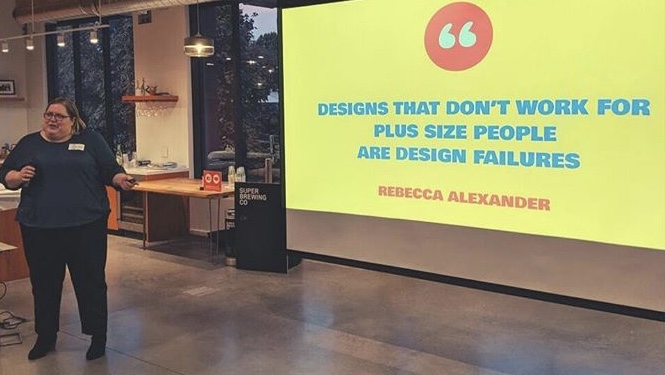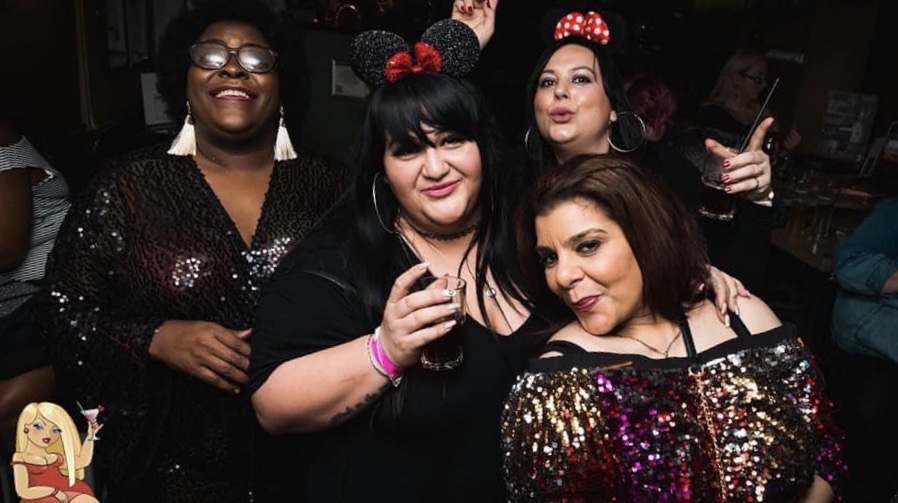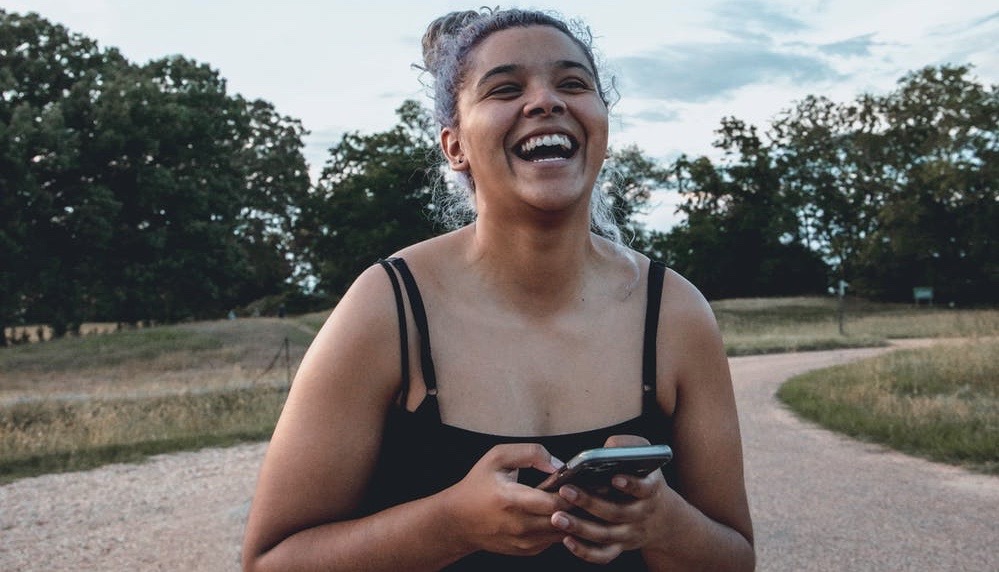From starting a now-viral hashtag to create a body-positive campaign, more plus-size women are using social media to empower themselves and normalize all shapes of bodies. How do they inspire others and promote their community?
Everyone’s gone, and so the headphones are on.
Music can be transformative for all of us, but for Tina Arletta, her playlist can turn her from a 21-year-old student into her alter-ego— a K-pop Bitch.
There are thousands of girls like her who share a love of Korean pop music. What makes this group different is that they are all plus-size women who desire for a space to be celebrated.
The group started with a simple hashtag “#BigKpopBitches”, which was created by Tina, realizing that most people who were sharing their love of K-pop music conformed to standard desirable selfies.
The idea of starting the hashtag wasn’t a whim. Many K-pop fans participate in what they call “selfie days”, which are a specific day of a month where fans post their selfies alongside photos of their favourite K-pop group on social media.
“We have a group chat that’s exclusive for plus-sized women, I saw that they were very body-conscious and unsure — to the point where they felt increasingly uncomfortable participating in the selfie days of the fandoms,” says Tina.
So, brainstorming with her group chat, all plus-size girls came up with the idea to create this hashtag where plus-sized people in any K-pop fandom could join and see people who are built and look like them to feel more visible.
With a little worried about the response that they might get from the social media, K-pop bitches are unexpectedly received thousands of positive comments and tons of curved girls shared their photos to expand this safe space. “I think the hashtag served its purpose of giving plus-sized fans dome confidence and positivity, and a lot of participants said that they never received so many compliments towards their body images in their life,” says Tina.
While the K-Pop Bitches might be the right way for people to interact online, social media can often be a challenging space. According to a study of 1000 men and women conducted by the Florida House Experience, a healthcare institution, 87% of women and 65% of men compare their bodies to images they consume on social and traditional media. In that comparison, a stunning 50% of women and 37% of men compare their bodies unfavourably.
Social media has very dominant hegemonic notions of “the perfect body image”, according to Sarah Merton, early stages PhD sociology researcher from London South Bank University. “People using social media will compare themselves with those misleading images unconsciously, which has a negative psychological influence on people viewing their own body images. That’s why a growing number of young people suffered from body dissatisfaction and body dysmorphic disorder,” Sarah explains.
The “K-pop bitch” Tina admitted such pressure when she saw the skinny body images of some K-pop celebrates on social media. She says, “I think the strict body and beauty standards of K-pop culture are concerning, and I feel that that’s why a lot of fans begin to feel unsure of themselves.”
To get rid of such body anxiety, plus-size girls like Tina started to turn the social media battleground into an inspiring platform. Hundreds of curvy girls with sunny smiles posted their photos using the stunning hashtag to empower themselves and created a relative judgement-free space to support each other. “I think social media can either make or break body positivity. But I think creating a space, feed, timeline filled with people who are accepting of all body types and don’t demean anybody definitely helps,” says Tina.
For the AllGo App founder Rebecca Alexander, social media is more than a platform to empower the plus-size group, but also a virtual community to make the world more accommodating for people of all sizes. Alexander set up the review application AllGo in 2018. It operates like a Yelp to rate the comfort and accessibility of public places, but what makes this application different is that this App is specifically targeted at the plus-size community.
As a woman wears a size 30, Alexandra knows how daunting for larger customers to eat out. “Whenever I would get invited somewhere new, I would spend hours scrolling through images online to determine whether or not the chairs of the restaurant had arms,” says Alexandra. She always felt anxious and embarrassed when she turned up to a new place that her body could not be accommodated.

According to the market research Allgo App did before, more than 61% of fat people experienced anxiety when they enter an unfamiliar place. “Deciding where to eat is a challenge for plus-size people. Diners often comb through endless photographs of restaurant food online, hoping someone has posted an image of the chairs or the space between tables,” says Kim Severson, food correspondent wrote an article for New York Times pointed out larger customers’ dilemma.
Therefore, Allgo App was built to collect larger costumers’ subjective reviews of public places and rate each space online to evaluate how fat-friendly there were. This App not only provides the reviews of food, service and accessibility of public sites like other review application but also collects data of seating options, aisle width, furniture’s size and even the information of whether business’ staff were responsive to customers’ size.
“We want to make sure that we recognize that servers are where they are, and part of our mission is to endear them to our cause to helping them accept people of size,” Alexander told the Mic. “We don’t want to troll them.”
What Alexander does now is expanding this virtual community, asking more users to download the App and to share their photos of inclusively designed spaces on social media with the hashtags #sizeinclusivity or #canweallgo. “This app is not just for a certain size of people, but for the people who want to make this world more accommodating and habitable,” says Alexander.
AllGo App as a virtual social media community facilitates plus-size people’s lives, but it may never satisfy some plus-sized party animals who eager for the real celebration. What Miranda Kane want to do is turning the virtual group into the offline celebration.

Miranda has been running the Club Indulge since 2013, which is an online chat group providing best body positive events offline in London. She hosts club nights and themed parties at Club Indulge every week, which including karaoke, rock nights, pub quizzes, speed dating and more activities.
“At Club Indulge, we pride ourselves on providing non-judgmental nights out for all sizes. We have first-hand knowledge of the kind of camaraderie and freedom you can enjoy when you are surrounded by people who have had the same fatphobic experiences as you. Many of us also know how hard it is to come to these kinds of events alone, after all, our straight-size pals might not get it,” says Miranda with a black volunteer T-shirt printed with the Club Indulge’s cartoon logo— a sexy curvy girl swings a glass of wine.
This logo image is what Miranda’s expectation of girls who participated in the club should look like. “We encourage people of different sizes, joining us without worrying about what they look like. Ladies could wear whatever they feel comfortable in, or anything they never had the guts to wear at a normal club. They could build their confidence so much that we may never see them again because they will feel too confident to go any clubs they want,” says Miranda believing offline gatherings for plus-size people could build their confidence and help them meet more friends.

Club Indulge is not only a space to boost confidence but also a shield protects plus-size people from the negative aspects of social media. “There are so many online dating places you can go to that are chock full of timewasters and people using it to keep their love of fat girls a secret, and I don’t want Indulge to be that. I want all Indulge events – including the online ones – to be about being honest and upfront about who you are, not lurking in the shadows,” says Miranda.
From K-pop Bitches to Club Indulge party animals, more plus-size girls are trying to defend the negative influence of social media and use it as a weapon to empower themselves and promote body diversity and positivity.
Social media can either make or break body positivity, however, because there are so many people who speak out to fight against fatphobic comments, to make changes for their communities, to love life and love their bodies, so people with different shapes and sizes will create a space filled with people who are accepting of all body types and don’t demean anybody.
Music on headphones is almost over, but those big K-pop spirits know their battle on social media just started.
